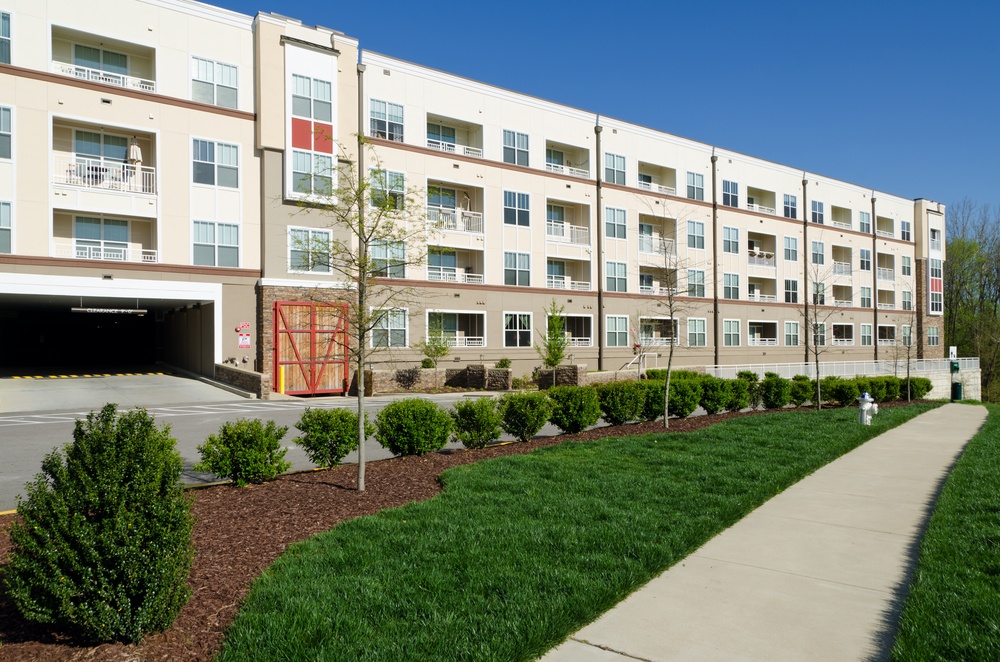When commercial landscape companies incorporate sustainable green landscaping, it provides their customers with a competitive advantage. Sustainable landscapes, which can be defined as those that are in proportion with local Eco-systems, micro climate and require minimal resources, such as labor, water, and fertilizer—are rarely seen as a necessity in ensuring a commercial real estate success.
For those not sure how to take the initial step toward going green, read on and take advantage of these 7 Sustainable Green Trends.
A Commercial Landscaping Company Takes Control of These 7 Trends
Many tenants are attracted to sustainable green buildings, and for good reasons, advantages include faster lease up rates, higher resale value, increased lease and retention, better occupancy, instant building recognition, attract buyers, drives business, reduce maintenance, less water, environmentally friendly, helps towards LEED Certification, drives local economy, improved public’s perception about your brand, and much more.
More often than not, a forward thinking commercial landscaping company will take control of the latest trends. In addition to water conservation, green based solutions include recycled materials such as recycled mulch, reclaimed watering systems, lawn conversions, substrate materials that capture and recycle water, smart irrigation technology, and Eco friendly landscaping, and the list goes on.
1. Recycled Materials
Numerous commercial landscaping companies incorporate recycled materials into their commercial landscaping design. It's important to be frugal and use recycled materials when at all possible. For example, impervious materials may already exist on the site such as pavers, boulders, used brick, or old concrete that could be incorporated into a retaining wall, walk way or patio seating wall.
Recycled landscape materials are readily available in a variety of forms, textures and colors, with many combining recycled stone, plastics with wood byproducts. Requiring minimal commercial landscape maintenance, they make great alternatives for traditional wood decks, benches, and raised planters. Materials such as decomposed granite, rubber mulch and concrete made from fly ash, or repurposed brick are also good alternatives for recycled materials.
2. Water Management
Water management starts with a good operating system, a recent study found that nearly 20 percent of the water used in and around public landscaping is lost due to leaks or inefficient irrigation practices such as incorrect watering run times, limited cycle and soak time, excessive watering frequency etc. Water management isn’t that complicated, especially when it comes to saving money on water, commercial irrigation services include managing and replacing broken irrigation equipment is where the low hanging fruit resides. One of the fastest ways to capitalize and get a R.O.I., is to have your irrigation system audited regularly. The irrigation auditor will capture water saving opportunities. It sounds simplistic, and it is, however, irrigation maintenance is something that must be scheduled several times per year, and in some cases quarterly if feasible. This frequency is based on the age of the, type and condition. For example, if your property receives lots of retail foot traffic, vandalism etc., these types factors should be considered when determining how often the audit should be performed. Simple repairs and adjustments would include remedial action for leaking irrigation valves, broken underground PVC pipes, mis aligned sprinkler heads, replacing antiquated sprinklers, monitor and adjust water pressure, repairing high flow water sources.
3. Smart Irrigation Technology
In addition to water management, smart irrigation technology is a must for creating a sustainable landscape that conserves and saves. For example, commercial landscape contractors in the bay area can engineer a system using smart watering technology, like low volume drip irrigation, pressure regulating check valves, weather-based irrigation controllers that make daily watering adjustments based on local weather, flow monitoring etc. Depending on the configuration and type of irrigation, a subsurface or point source drip irrigation system may be considered as part of a larger conversion, and should be discussed with your landscape designer. If a system is fairly modern, technology exists that make it easier for installing flow monitoring technology, this technology may include moisture sensing devices, master flow valves, flow sensor, submeter for capturing real time data. Even if the system is old, an irrigation system must be equipped with water efficient heads that minimize wind drift, over-spray onto hardscape, pavement and building structures.
4. Lawn Conversions
As water costs rise, combined with concerns for future water availability, commercial building owners alike are considering alternatives for low maintenance-water efficient landscaping. More often than not, drought resistant grasses can be a beneficial alternative to traditional landscaping, especially for those who want to reduce maintenance and water. More importantly, a commercial landscaping service can install ornamental grasses that are resilient and adaptable without serious repercussions to a plant’s health, additionally, they are resistant to the hot summer heat out performing traditional flowers, and don’t need to be mowed which cuts down on maintenance. The same holds true for cold, dry winter weather, choosing this dramatic paradigm, they are lowering both water costs and maintenance incrementally.
5. Drought Friendly Landscaping
As with most commercial landscape companies, here’s what we have learned over the last several years, by switching to drought tolerant plants, we use less water. Drought resistant plants, once established use half the amount of water as traditional lawn, and still see thriving and blooming landscape that requires much less maintenance. Bay Area Commercial Landscapers that embrace these concepts help their customers reduce water costs while keeping plants green and thriving, in spite of the high cost of water. Here’s the message, we can stay green, help the environment and save.
6. Recycled Water
According with The National Association of Landscape Professionals, the bay area drought over the past several years has pressured owners and managers to conserve water, and has positively improved the public’s perception about commercial landscape companies. The scarcity of water in the bay area has gained interest of many bay area building owners and managers, the challenges have required them to think differently when it comes to water conservation. As things have progressed, California has set a new trend for the rest of the country to rethink the importance of water conservation, and how we can become better environmental stewards in consideration of recycling, sustaining and going green.
Using efficient irrigation systems that are properly designed, installed, and maintained, is one way to conserve our precious resource, water. Another way, certainly, is to install drought friendly landscaping that requires less water and maintenance. Another way still is to recycle and reuse water and generally improve on how to manage storm water runoff.
7. Integrated Pest Management (IPM)
According to the UC State Wide Program, IPM is a sustainable green strategy that encourages a long-term approach to pest management through corrective actions which include natural and biological control, trapping, cultural practices, mechanical actions and use of pest resistant type plants. Pesticides are used only when all safe methods are exhausted, and treatments are made with the end result of eliminating or controlling the pest. Pest control materials are selected and applied in a manner that minimizes risks to people, pets and the environment. With IPM, one can take measurable actions to manage and suppress pests, such as by installing sustainable landscaping, plant varieties that are less prone to pests, using disease-resistant plants that detour insect and disease problems.
As environmental stewards, some HOA landscape companies in the bay area see the economic value of using an integrated pest management approach, including healthier plants and tree options, environmentally friendly products that have less of an impact on the surrounding community, reduce air pollution, reduce the potential for ground water contamination, reduces the likelihood of pesticide exposure to people, pets and the surrounding public.
Embracing IPM management provides economic value due to sustained development, increased productivity and reduced pest problems. The idea is that IPM is making the difference and less reliance upon chemicals, it’s the new trend. In the long run, its best for our environment and a sustainable landscape solution that’s here to stay.
When thinking about going green? Think about the opportunity of instant building recognition that comes with sustainable green landscapes. Not only does eco-friendly landscaping help our environment, more often than not, it’s an attraction to new occupants and tenants.
We Go Where You Go!
| Santa Clara County | Alameda County | San Mateo County |
| Silicon Valley, CA | Fremont, CA | Palo Alto, CA |
| San Jose, CA | Newark, CA | Menlo Park, CA |
| Santa Clara, CA | Union City, CA | San Carlos, CA |
| Sunnyvale, CA | Hayward, CA | Belmont, CA |
| Mountain View, CA | San Leandro, CA | Redwood City, CA |
| Cupertino, CA | Alameda, CA | Foster City, CA |
| Milpitas, CA | Dublin, CA | Burlingame, CA |
| Morgan Hill, CA | Pleasanton, CA | Daly City, CA |
| Gilroy, CA | Livermore, CA | South San Francisco, CA |
Ready to Go Green? FloraTerra Landscape Management can assist facility managers and building executives with the implementation and design process for sustainable green landscaping. We install and maintain eco-friendly landscaping that provides a soothing, healthy outdoor space.
For more information, please phone 408.275.1200, or click below
About FloraTerra Landscape Management
FloraTerra of Silicon Valley and its affiliates, are based in San Jose, California. As a leading commercial landscape maintenance company in San Jose Ca, FloraTerra specializes in Industrial and commercial landscape management, since its origin, the company and its affiliates have installed and maintain some of the most prestigious properties throughout the San Jose and San Francisco Bay Area.






